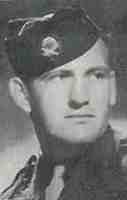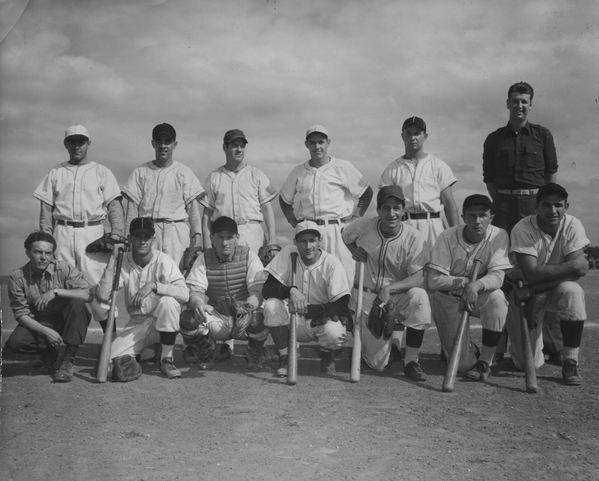

Go on, why not sponsor this page for $5.00 and have your own message appear in this space. Click Here for Details |
Buck Compton
Date and Place of Birth:
December 31, 1921, Los Angeles, California
Baseball Experience: College
Position: Catcher
Rank: Lieutenant
Military Unit: 506th
Parachute Infantry Regiment, 101st Airborne Division US Army
Area Served: European Theater of
Operations
 Lynn
"Buck" Compton was an All-American catcher at UCLA and played football in the
1943 Rose Bowl. His wartime exploits have recently been depicted in the "Band of
Brothers" television series.
Lynn
"Buck" Compton was an All-American catcher at UCLA and played football in the
1943 Rose Bowl. His wartime exploits have recently been depicted in the "Band of
Brothers" television series.
At the end of 1943 his college athletic days were over as military service
beckoned and the big, slow-talking Californian attended Officer Candidate's
School. He graduated as a 2nd lieutenant, and then trained as a paratrooper at
Fort Benning, Alabama. In December 1943, Compton joined the 506th Parachute
Infantry Regiment (PIR) of the 101st Airborne Division based at Aldbourne,
England.
At around 1am on June 6, 1944, Compton and the 506th PIR were over Utah Beach,
Normandy. In a hail of enemy gunfire and in a state of almost total disarray, the
paratroopers landed on French soil. Six hours after landing, Compton led an
assault against a four-gun battery of 105mm cannon that was defended by a
platoon of German infantry and was firing on Utah Beach where American troops
were coming ashore in their hundreds. Compton was awarded the Silver Star for
his part.
He was back in England by July and remained there until September. Then, during
the afternoon of the 17th, the 506th parachuted into Holland as part of
Operation Market Garden. During a battle in which Compton's company was attacked
by infantry and tanks he was severely wounded. Compton was such a big man that
he could not be carried, so a door was pulled off a nearby farm building,
Compton was rolled onto it and skidded down the road and into a ditch and out of
immediate danger. He was hospitalized for more than two months but returned to
combat in December 1944 - in time for the defence of Bastogne.
The 506th suffered heavy losses during the Battle of Bulge. Weather conditions
were treacherous and, in the heavy snow, Compton suffered a severe case of
trenchfoot. He was evacuated and his combat days were over.
Recuperating in France, Compton met Charles Eisenmann, player-manager of the
Seine Base Clowns baseball team in Paris. "Buck was one of my best friends,"
remembers Eisenmann. "I was going on a train - out to the coast - and Buck came
up to me and said 'I'm Lieutenant Compton, I'd like to join your team.'"
Eisenmann was in need of a catcher and had military orders made up that allowed
Compton to play with the Clowns, one of the best teams in the European Theater,
until the end of the war.
 |
| Seine Section Clowns in France, 1945. Buck Compton is front row, third from left. Chuck Eisenmann is front, center. |
When Compton returned to the US he spent five years as a detective in the Los
Angeles Police Department. In 1952 he began 20 years as a prosecutor for the
district attorney's office. In 1968, he was responsible for the investigation of
Robert F Kennedy's assassin, Sirhan Sirhan. He was later appointed an associate
judge in the California Court of Appeals.
Author, Marcus Brotherton, is currently collaborating with Buck Compton on a book. It will be on stands July 2008, published by Penguin.
Created January 20, 2007. Updated July 21, 2007.
Copyright © 2015 Gary Bedingfield (Baseball
in Wartime). All Rights Reserved.